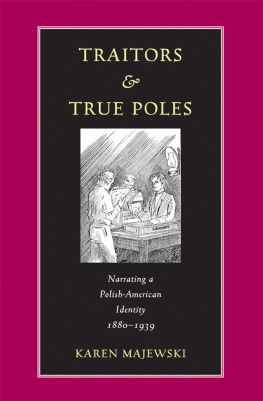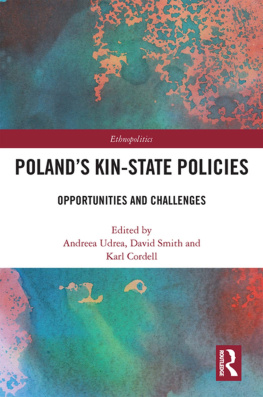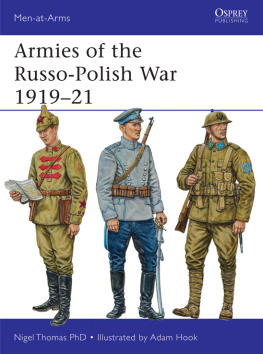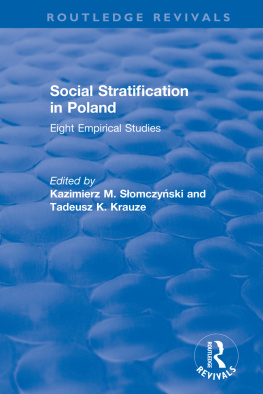Traitors and True Poles
Ohio University Press Polish and Polish-American Studies Series
Series Editor: John J. Bukowczyk
Framing the Polish Home: Postwar Cultural Constructions of Hearth, Nation, and Self, edited by Boena Shallcross
Traitors and True Poles: Narrating a Polish-American Identity, 18801939, by Karen Majewski
SERIES ADVISORY BOARD
Stanislaus A. Blejwas (19412001), Central Connecticut State University
Robert E. Blobaum, West Virginia University
Anthony Bukoski, University of Wisconsin-Superior
Bogdana Carpenter, University of Michigan
Mary Patrice Erdmans, Central Connecticut State University
Thomas S. Gladsky, Saint Marys College of Ave Maria University (ret.)
Padraic Kenney, University of Colorado at Boulder
John J. Kulczycki, University of Illinois at Chicago (ret.)
Ewa Morawska, University of Pennsylvania
Antony Polonsky, Brandeis University
Brian Porter, University of Michigan
James S. Pula, Utica College of Syracuse University
Thaddeus C. Radzilowski, Saint Marys College of Ave Maria University
Daniel Stone, University of Winnipeg
Adam Walaszek, Jagiellonian University
Theodore R. Weeks, Southern Illinois University
Traitors and True Poles
Narrating a Polish-American Identity, 18801939
Karen Majewski
OHIO UNIVERSITY PRESS
ATHENS
Ohio University Press, Athens, Ohio 45701
2003 by Karen Majewski
Printed in the United States of America
All rights reserved
Ohio University Press books are printed on acid-free paper

11 10 09 08 07 06 05 04 03 5 4 3 2 1
Library of Congress Cataloging-in-Publication Data
Majewski, Karen.
Traitors and true Poles : narrating a Polish-American identity, 18801939 / by Karen Majewski.
p. cm. (Ohio University Press Polish and Polish-American studies series)
Includes bibliographical references and index.
ISBN 0-8214-1469-0 (alk. paper) ISBN 0-8214-1470-4 (pbk. : alk. paper)
1. American literaturePolish American authorsHistory and criticism. 2. Polish AmericansIntellectual life. 3. Polish Americans in literature. 4. Immigrants in literature. I. Title. II. Series.
PS153.P65 M35 2003
810.9'89185dc21
2002030711
Cover art: From Jak mona osign bogactwo i wpyw w Ameryce (How to acquire money and influence in America) [Toledo: Paryski], 1911.
ISBN 978-0-8214-4111-4 (e-book)
Publication of books in the Polish and Polish-American Studies Series has been made possible in part by the generous support of the following organizations:
Polish American Historical Association, Orchard Lake, Michigan
Stanislaus A. Blejwas Endowed Chair in Polish and Polish American Studies, Central Connecticut State University, New Britain, Connecticut
St. Marys College of Ave Maria University, Orchard Lake, Michigan
The Polish Institute of Arts and Sciences of America, Inc., New York, New York
Additional support for this book has been provided by the Kulczycki Prize awarded by the Polish American Historical Association
To Helena Sta
Illustrations
CHAPTER 1
CHAPTER 2
CHAPTER 3
CHAPTER 4
CHAPTER 5
CHAPTER 6
Series Editors Preface
WHILE THE LITERATURES of a few immigrant communities already have entered the contemporary American literary canon, literary life within Poloniathe Polish immigrant and ethnic communityremains to date largely terra incognito. Heavily peasant in composition, the Polish immigrants of the late nineteenth and early twentieth centuries often have been portrayed as an inarticulate, undifferentiated mass, silent and rough like the coal many of them dug in the mining towns of industrial America.
In Traitors and True Poles Karen Majewski gives us a truly pathbreaking work that decisively dispels the image of the voiceless Polish peasant. A singular expert on the ethnic literary genre, Majewski here reconstructs an entire ethnic literary tradition, one nearly extinguished by the ravages of language loss, the passage of time, and simple neglect. From it, she explores the nationalist and feminist themes that animated immigrant discourse within the Polish ethnic community between the 1880s and the 1930s. Along the way, Majewski also has managed to assemble biographical profiles of hitherto little known Polish migr writers who formed an influential cultural elite (and, in some measure, political cadre) in turn-of-the-century Polish America: the immigrant intelligentsia.
A thoroughly interdisciplinary work, Traitors and True Poles not only speaks to matters literary and cultural but also plumbs the foundations of one ethnic groups hyphenated American cultural identity. Majewski persuasively argues that literature (and the arts) were powerful ideological tools in the struggle to define Poland and Polishness, on both sides of the ocean at a time when the Poles were a submerged and colonized nation (and later, when a postWorld War I Poland, recreated as a result of the Treaty of Versailles, was compelled to reinvent itself). Examining a cluster of interlacing literary topics, Majewski shows that this transnational immigrant literature served as an instrument of national definition and consolidation during these years and that its audience was not the American or outside world but the immigrant community alone and for itself. Traitors and True Poles accordingly stands as a landmark work in the field of immigrant history, outsider literature, and ethnic studies.
Winner of the Polish American Historical Associations prestigious Kulczycki Prize, Traitors and True Poles is the second volume in the new Ohio University Press Polish and Polish-American Studies Series. The series revisits the historical and contemporary experience of one of Americas largest European ethnic groups and the history of a European homeland that has played a disproportionately important role in twentieth-century world affairs. The series will publish innovative monographs and more general works that investigate under- or unexplored topics or themes or that offer new, critical, revisionist, or comparative perspectives in Polish and Polish-American studies. Interdisciplinary or multidisciplinary in profile, the series seeks manuscripts on Polish immigration and ethnic communities, the country of origin, and its various peoples in history, anthropology, cultural studies, political economy, current politics, and related fields.
Publication of the Ohio University Press Polish and Polish-American Studies Series marks a milestone in the maturation of the Polish studies field and stands as a fitting tribute to the scholars and organizations whose efforts have brought it to fruition. Supported by a series advisory board of accomplished Polonists and Polish-Americanists, the Polish and Polish-American Studies Series has been made possible through generous financial assistance from the Polish American Historical Association, the Polish Institute of Arts and Sciences of America, the Polish Chair at Central Connecticut State University, and St. Marys College of Ave Maria University and through institutional support from Wayne State University and Ohio University Press. As an ambitious new undertaking, the series meanwhile has benefited from the warm encouragement of a number of persons, including Gillian Berchowitz, the late Stanislaus Blejwas, Thomas Gladsky, Thaddeus Gromada, James S. Pula, David Sanders, and Thaddeus Radzilowski. The moral and material support from all of these institutions and individuals is gratefully acknowledged.










